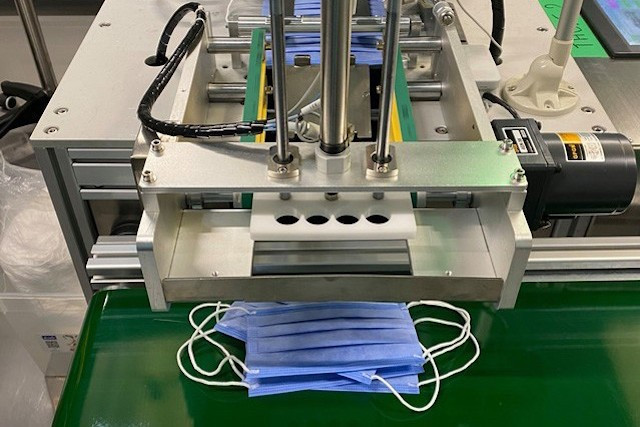The supply of masks was one of the issues at the beginning of the crisis for many countries. The local production of this equipment will prove valuable for ensuring some level of autonomy in terms of PPE.
Michel Schuetz, director of Santé Services, a subsidiary of the Robert Schuman Hospital Foundation, “proposed on 1 April to build a mask machine”, says Marc Glesener, managing director of the company.
Given the date, the team initially thought it was a joke. A few months later, however, it is still standing in the middle of the hall in Gasperich.
Eight dedicated employees
Made in China, it first had to be installed and adapted to the needs of the eight people to make it work. Not to mention obtaining all the necessary certifications and complying with the European standard (EN14683).
It was only after this work was completed that the masks were ready for sale at the end of August. “We produce an average of 20,000 per day,” Glesener said. The machine runs about seven hours a day, but if necessary it could run 24/7 to ensure an annual production of “40 million masks”.
The machine cost about €200,000, financed by the ministry of the middle classes. An additional €100,000 was needed for adjustments.
The current production “corresponds to the demand”, the managing director said. The customers are mainly hospitals, doctors, nursing homes and supermarkets, who buy the masks at a different price depending on the quantity. The cost price is above 25 cents for Santé Services.

Raw materials come mainly from Germany and are assembled on site. Photo: Santé Services SA
Marc Glesener explains that this is due to the fact that labour and raw materials are more expensive here than in China, where the mask costs between 4 and 16 cents, according to Franceinfo. Filters, elastic straps... all the parts of the Luxembourg mask come from Germany, except for the foldable metal wire used to adjust it to the level of the nose, which comes from Asia, but the company is still looking for a European producer.
“We cannot and do not want to compete with Chinese products. We do not have a lucrative goal,” Glesener said. Profits from sales are used for operating costs or are reinvested. Thus, the company has already been able to acquire a second machine, this time to produce FFP2 masks (conical shape).
12,000 FFP2 per day
The second machine arrived a month ago and is still in the test phase. The budget is the same as for the first one, but the output is lower because of a “more complex” production process. Santé Services hopes to launch production of 12,000 FFP2 masks per day by the end of October.
And even if the primary goal is to fight against supply difficulties in Luxembourg, Glesener is planning for the future. “The use of masks is not going to decline,” he believes, recalling that in China, for example, citizens were already wearing them on public transport before the crisis. In any case, “we will adapt our future production to the needs”.
Prime minister Xavier Bettel (DP) and miniser of middle classes Lex Delles (DP) were due to visit the factory on Tuesday afternoon.
This article was originally published in French on Paperjam.lu
